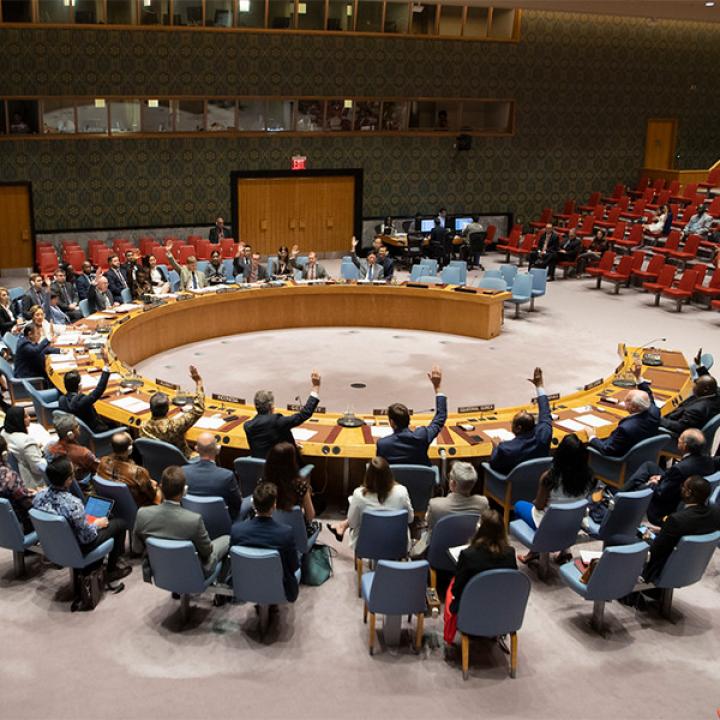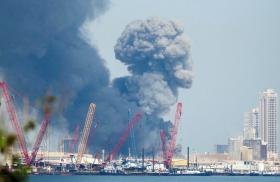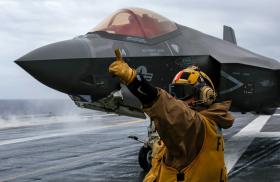
- Policy Analysis
- PolicyWatch 4127
Gaza’s Future Hinges on a Clear UN Security Council Resolution

With Hamas already regrouping, U.S. officials must help craft targeted language that empowers the Board of Peace to oversee a technocratic administration and stabilization force, with the goal of quickly filling the territory’s governance and security vacuum.
A temporary International Stabilization Force (ISF) is central to President Trump’s plan for ending the Gaza war. According to the president and his secretary of state, Marco Rubio, many countries are prepared to contribute both funds and personnel to the force, but Rubio has also stated that key potential contributors are conditioning their participation on the establishment of a United Nations Security Council mandate. For some, like Indonesia—which has experience in peacekeeping operations—such a resolution meets national legal requirements for contributing to forces; for others, including possible Arab contributors, it simply creates an aura of legitimacy for providing forces.
Alternatives for a UN Resolution
Regardless of the reason, the Trump administration has embraced the idea of producing a UN Security Council resolution and is likely to promote one soon. Resolutions falling under Chapter VII concern threats to peace and the use of force or sanctions in response. For the Israeli-Palestinian conflict, establishing the precedent of applying Chapter VII resolutions would be unwise. Force will not end this conflict, and the United States will be thrust into constantly having to head off or veto ill-considered resolutions. Resolutions under Chapter VI—with their emphasis on diplomacy—make more sense at this stage, and the administration should seek such a resolution to endorse the Trump peace plan and its twenty points.
Necessarily, this resolution would empower the plan’s Board of Peace, which is designed to oversee a “technocratic” Palestinian administration and the ISF in guiding the transitional period in Gaza. The resolution must be narrowly focused on giving power and authority to the Board of Peace so that it can work with the technocratic administration and define the role and missions of the ISF. This mission must include law enforcement and disarmament of Hamas, despite concerns from some actors about these roles.
The temptation with most such resolutions, especially those related to the Israeli-Palestinian or Arab-Israeli context, has been to include reference to all previous resolutions calling for an end to the conflict. That by itself is not a problem, but one must recognize that Russia and maybe China will likely want to make any such resolution as broad as possible, with an ongoing role for UN agencies and an emphasis on the political character and purposes of the resolution. Such resolutions appeal to the lowest common denominator in the UN and gain automatic support, but they have little or nothing to do with changing the reality on the ground. Gazans do not need symbolic resolutions; they need an end to the war with an alternative administration on the ground that builds the basis for a different future.
To that end, the Trump plan calls for establishing the Board of Peace and “immediately” deploying the ISF “in Gaza.” Every day that goes by without this force being constituted and deployed will make it harder to take the first step in transforming Gaza, as the plan envisions.
Preventing a Hamas Rebound
Already, Hamas is reconstituting itself in a part of Gaza from which the Israel Defense Forces has withdrawn. The longer it takes to establish the force and an alternative administration, the more Hamas will project the image of its own permanence. The crux of the Trump plan calls for the disarmament of Hamas—and the demilitarization of the Strip—in return for full Israeli withdrawal and reconstruction. Without disarmament, there will be neither Israeli withdrawal nor reconstruction. In other words, demilitarization is the key to Gaza’s future, and the ISF, according to the Trump plan, will assume a role in the decommissioning or handing over of weapons and monitoring of disarmament.
That is the theory. Unfortunately, at this point, a clear mandate for the ISF has yet to be established by an empowered Board of Peace. Views differ on what that mandate should be. Egypt and others see it as one in which the ISF will act to prevent smuggling and help with demilitarization, but will play no role in law and order within Gaza—that, they say, should be the role of Palestinian security forces largely trained by Egypt. Discussions with Egyptian and other Arab officials have revealed their view that only Palestinian security forces can or should deal with internal security challenges. But at this stage, the idea that Palestinian security forces can impose law and order, and challenge Hamas if it acts against the alternative administration or the public, is simply unrealistic. In fact, the Egyptian approach is not based on taking on Hamas but on including it within a new Palestinian consensus in which the group acquiesces to the new arrangements. But such an effort ignores the reality that Hamas leaders will demand a payoff in return for any governing arrangement requiring them to disarm and accept an alternative administration—and that payoff will involve acceptance of their continuing role in Gaza. Nothing would more clearly contradict the letter and spirit of the Trump plan.
Creating an Effective Board of Peace
So what can be done?
- First, ensure the resolution makes clear the Board’s responsibility to determine ISF missions. That would not mean changing Israel’s status as the occupying power; only an end-of-conflict political agreement could do this.
- Second, the Board of Peace will need to coordinate with Israel, at a minimum, to ensure that the ISF does not include international or regional forces unacceptable to Israel.
- Third, the Board must take account of the lessons of failed international peacekeeping forces like the UN Interim Force in Lebanon (UNIFIL), even allowing for the clear differences between Lebanon, which is a sovereign state and has a government, and Gaza, which obviously does not.
On the last count, even when UNIFIL was supposedly bolstered by UN Security Council Resolution 1701 after the 2006 Lebanon war, it never fulfilled its missions: assisting the Lebanese Armed Forces in establishing a demilitarized zone in southern Lebanon; preventing Hezbollah from building up militarily or operating in the south; and maintaining a ceasefire in the face of Hezbollah’s military activity. Far from preventing Hezbollah’s military buildup, UNIFIL assisted in covering it up, and when the UN force did take tentative steps to limit or simply observe Hezbollah activities, it was attacked. Moreover, UNIFIL limited what Israel could do in response to violations. Hamas must not be allowed to replicate Hezbollah’s actions—meaning it can neither reconstitute itself militarily nor attack the ISF with impunity.
Either development would defeat the purpose of the ISF, which is to advance the Trump plan. With that in mind, the UN resolution must require the ISF to work closely with the Civil-Military Coordination Center, which was set up by the United States with multinational participation. The force’s missions should encompass maintaining public order, securing the delivery of humanitarian assistance, preventing smuggling, and helping with disarmament. The assumption of these roles over time by Palestinian police forces, excluding Hamas, should be supported by the ISF—but that is not realistic in the near term.
Protecting Gazans to Sideline Hamas
Only if the people of Gaza feel adequately protected from Hamas threats and coercion will they be able to express their displeasure with a continued role for the group. It is one thing for Arab states to pressure Hamas; it is something else for the Palestinian public in Gaza—which has become increasingly alienated from Hamas and wants to breathe and live a more normal life—to feel safe enough to make their opposition known. That will raise the price to Hamas of refusing to accept the new arrangements. The group’s leaders present themselves as if they were organically linked to the Palestinians and the embodiment of the cause—so opposing the Gaza public in such circumstances would contradict Hamas’s self-image and further erode its legitimacy. The surest way to ensure Hamas does preserve itself for eventual Gaza rule, by contrast, is to grant it a voice in selecting the technocratic administration and to exclude the ISF from providing for law and order and public safety. President Trump will need to use his leverage with the key Arab states, which will almost certainly have representatives on the Board of Peace, to accept the idea that the ISF, joined over time by Palestinian police, must play a role in public safety and protection.
For those who want to seize the moment created by the Trump plan, now is the time to produce a UN Security Council resolution that empowers the Board of Peace and thus the ISF in the areas of public safety, disarmament, and support for the Board and the technocratic Palestinian administration. Otherwise, a scenario may play out that actually helps Hamas reemerge and reassert its rule over Gaza.
Dennis Ross is the Davidson Distinguished Fellow at The Washington Institute and a former senior official in the Reagan, Bush, Clinton, and Obama administrations. Brig. Gen. Assaf Orion, IDF (Res.), is the Institute’s Rueven International Fellow, a senior research fellow at the INSS, and former head of the IDF Strategic Planning Division.




